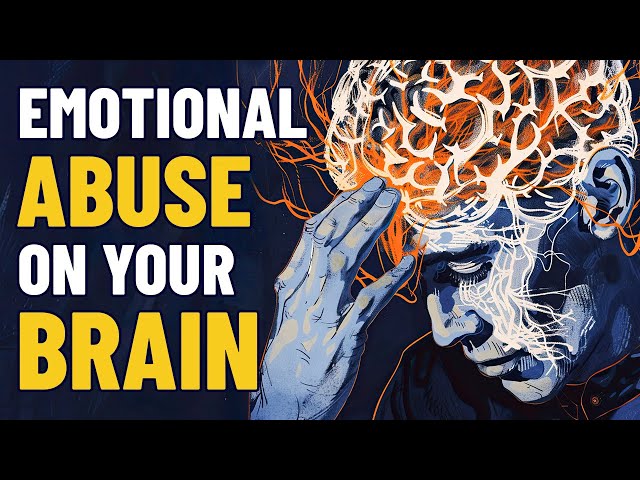Imagine waking up every day feeling like you’re walking on eggshells, unsure of how the day will unfold. Maybe you question your worth or replay hurtful words in your mind, trying to understand how someone you care about could make you feel so small. If this sounds familiar, you’re not alone. Emotional abuse is a sneaky predator, often creeping into our lives disguised as love or concern. But what many people don’t realize is how deeply it affects the brain, literally changing how you think, feel, and perceive the world.
You see, emotional abuse isn’t just about hurt feelings or harsh words; it’s a systematic attack on your self-worth, designed to control and manipulate you. With that in mind, let’s dissect what actually happens to your brain when you’re subjected to such cruelty.
1. Changes in Brain Structure: The Physical Impact of Emotional Abuse
When we talk about emotional abuse, we generally focus on the psychological and emotional toll. But it can actually change the physical structure of the brain. Chronic emotional abuse floods your brain with stress hormones like cortisol, which can shrink the hippocampus, a part of the brain imperative for memory and learning. Because of this, it becomes harder to concentrate, learn new things, or even remember details from your day-to-day life.
On top of that, the prefrontal cortex, which helps you make decisions and control your impulses, can also be affected. If you’ve ever felt stuck in a cycle of making poor decisions or found yourself unable to break free from destructive patterns, this might be why. Emotional abuse rewires your brain in a way that makes it difficult to think clearly or plan for your future, keeping you trapped in the present moment of pain and confusion.
2. The Overactive Amygdala: Living in a State of Constant Fear
Are you always on edge, even in situations that aren’t actually dangerous? That’s your amygdala at work. The amygdala is the brain’s fear center, responsible for your fight-or-flight response. When you’re emotionally abused, your amygdala can become hyperactive, and you feel anxious or fearful even when there’s no immediate threat.
This heightened state of alertness feels like a constant background noise in your life, making it impossible to relax or feel safe. You might find yourself overreacting to minor stressors or always expecting the worst. And it’s more than a mental state; it’s a physical change in your brain that can leave you feeling exhausted and on edge.
3. The Emotional Toll: Depression, Anxiety, and Emotional Regulation
In addition to hurting your feelings, emotional abuse can throw your brain’s chemistry completely out of whack. Neurotransmitters like serotonin and dopamine, which regulate your mood, become imbalanced, leading to anxiety and even depression. Consequently, it’s hard to feel happy or motivated, and small tasks easily become overwhelming.
Furthermore, since the part of your brain that helps regulate your emotions, the prefrontal cortex, might not function as well as it should, you may experience intense mood swings, feeling fine one minute and devastated the next. This can also make it really difficult to manage stress, which is why you feel like your emotions are out of control.
4. Cognitive Dissonance: When Your Mind Can’t Reconcile the Pain
Cognitive dissonance is a fancy term for the mental conflict that arises when you hold two contradictory beliefs at the same time. In an abusive relationship, this happens when you try to reconcile the love or attachment you feel for your abuser with the pain they’re causing you.
Your brain doesn’t like this kind of conflict, so it tries to resolve it by either rationalizing the abuse or minimizing its impact. Unfortunately, this can keep you trapped in the relationship because your brain is constantly trying to make sense of the contradictory emotions you’re feeling instead of recognizing the abuse for what it is.
5. Trauma Bonding: When Abuse Feels Like Love
Trauma bonding is one of the most insidious effects of emotional abuse. It happens when a victim forms a deep emotional attachment to their abuser due to a cycle of abuse followed by periods of affection or kindness. These positive moments often create a powerful emotional bond that makes it difficult to leave the relationship.
Your brain plays a big role in trauma bonding. During the “honeymoon phase” of the abuse cycle (when your abuser is being kind or loving), your brain releases feel-good chemicals. This creates a sense of relief and happiness that you become dependent on. Even though the abuse is damaging, your brain starts to associate these brief moments of kindness with safety and love, thus keeping you tethered to your abuser.
6. Low Self-Esteem and Altered Perception of Reality
Perhaps the most damaging aspect of emotional abuse is how it can warp your perception of yourself and the world around you. Over time, you might start to internalize the negative messages from your abuser, resulting in low self-esteem and a diminished sense of self-worth. Under these circumstances, you might start to believe that you deserve the abuse or that you’re not worthy of love and respect.
Gaslighting, a common tactic in emotional abuse, can also alter your perception of reality. It’s when your abuser manipulates you into doubting your own memories or perceptions. You might start to question what’s real and what’s not, ending in confusion and disorientation. This can make it even harder to leave the relationship because you no longer trust your own judgment.
The sad truth is that emotional abuse is a powerful force that can drastically change your brain. But these changes don’t have to be permanent. The human brain is incredibly resilient, and with the right support, you can begin to heal. Recognizing the effects of emotional abuse is the first step toward recovery. And you don’t have to go through this journey by yourself. Whether it’s through therapy, support groups, or simply talking to someone you trust, reaching out for help can make a world of difference.
Healing does take time, but it is possible. By understanding how emotional abuse affects your brain, you can start to take back control of your life and rebuild your sense of self-worth.







Leave a Comment